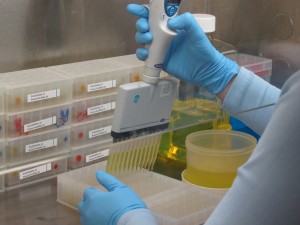Audio
Getting By, Getting Ahead: Seacoast Boutique Owner Bets On Success In High-Rent Downtown
- Assiah Russell started her jewelry business after getting lost in New York City in 2003. “I was in a jewelry district, took a look around, and thought it was quite wonderful to be lost there, and went into a store to buy some jewelry,” Russell says. “And they said, ‘Well no, no, no, you can’t be here! You have to be a wholesaler!’ To which I quickly replied, ‘Well, I am, and you’re my first vendor!'”
- After a few years of selling jewelry out of her home and at special parties, Russell moved to her tiny shop on State Street. Five years later, she decided to move to the high rent Market Street. “I felt like my business had grown even during a recession. So I felt that the signs, for me, were pointing to making the move,” Russell says.
- “It was a rather astronomical leap to move from State Street to Market Street,” Russell says. “The move has certainly allowed me to spread out and show my inventory better. I’m right in the center of the fashion district of Portsmouth. I’m hard to be missed.”
- “It’s always a struggle,” Russell says. “I’m not trying to suggest that the streets are lined with gold. I think there is a recession and I think people are mindful of what they’re spending and how much they’re spending, to be sure.”
- “Sometimes people are making more choices about whether they’re buying a gift or whether they’re buying something for themselves,” Russell says. “In other times, it was really easy, it would be ‘One for you, one for me!’ Now people make more choices.”
- Although her first year on Market Street has been a good one for Russell, it, “Struck terror in my heart,” she says. “It was a calculated risk, along with a leap of faith. And when I got here, I think the exposure helped with the recession. I’m seeing more people here.”
As part of our weekly “Getting By, Getting Ahead” series, StateImpact is traveling across New Hampshire, gathering personal stories from the people behind the economy. In our fourth installment, we visit a bustling boutique in the Seacoast region.
_____
Walk down Market Street in downtown Portsmouth, and you’ll see clothing boutiques, a kitchen store, a toy shop. Then there’s Puttin’ On The Glitz. And the name says it all. Inside, 60-year-old owner Assiah Russell is fussing with mounds of jewelry resting on her countertop, preparing her window displays.
“Eventually everything will have a home,” Russell says, laughing. “I just got done doing this window this morning. I had to get up at five o’clock to do it, because I like to have it done before the store opens.” Hands full of bracelets and necklaces, she gestures toward the finished product: Brightly painted mannequin heads sport wide-brimmed designer straw hats with pink, orange, and turquoise flower cut-outs dangling overhead.
But she’s not done yet. Russell points to the far side of the store. “Then this afternoon, because it’s a rainy day, perhaps I’ll get a chance to work on that window,” she says. Continue Reading
Preview: Tomorrow’s Installment Of “Getting By, Getting Ahead” Looks At High Rent For Downtown Retailer

Amanda Loder / StateImpact New Hampshire
Keeping downtown Portsmouth retailers open for business involves maintaining a delicate balance of shops, restaurants, residential offerings and office space.
Tomorrow on Morning Edition, NHPR will air the fourth installment of our summer series, “Getting By, Getting Ahead,” which focuses on the stories of the people behind the economy. This week, we’ll look at a Portsmouth shopkeeper who decided to move to a high-rent district downtown in the hope of expanding her business.
If you’d like to learn more about why rent is so high in downtown Portsmouth, check out our Economic Snapshot. You can also hear tonight’s discussion of the issue with All Things Considered host Brady Carlson.
And, we invite you to check back here tomorrow to hear more personal perspectives on the economic recovery in the Granite State. We’ll have a multimedia tool featuring the voices–and photos–of the people we’re spotlighting this summer. It also includes an interactive map with economic data so you can see how each of New Hampshire’s seven regions stack up. And there’s email and call-in information so that you can share with us your story of getting by–or getting ahead–in the down economy.
Getting By, Getting Ahead: More On The Upper Valley’s Strengths–And Challenges–In The Start-Up Economy

Amanda Loder / StateImpact New Hampshire
The Upper Valley is a natural incubator for high-tech start-up activity.
This week for our series “Getting By, Getting Ahead,” which looks at the personal stories behind New Hampshire’s economy, we’ve been focusing on start-ups in the Upper Valley. Bioengineering entrepreneur Tillman Gerngross was the subject of our latest profile. Recently, we discussed the regional start-up scene on All Things Considered.
Who’s On Welfare In New Hampshire, What Are They Buying And How Much Should You Care?
At the end of May, convenience store clerk Jackie Whiton took a public stand against the unrestricted use of public assistance cash-benefits by refusing to sell cigarettes to a customer using an EBT card. Last week, House Speaker William O’Brien took up the cause. We want to know – how big a problem is this?
Right now, needy Granite Staters can receive both cash assistance and food stamps on a debit-like EBT card. Food stamps, however, are much more widely received than cash assistance: 56,962 New Hampshire households receive food stamps from the federal government, while only 13,950 households also receive cash benefits. That’s 2.7 percent of the state’s households receiving cash assistance, about 60 percent of which comes from state funds. Continue Reading
Getting By, Getting Ahead: Start-Up Entrepreneur Brings High-Tech Talent To Rural N.H.
- “We’re in an industry that is not entirely recession-proof,” says Adimab co-founder and CEO Tillman Gerngross. “But the drug industry is a lot less volatile and subject to discretionary spending, because people get sick and they need drugs. Fortunately, we’ve been able to establish a sort of leadership position in the discovery of antibody-based therapies, and [the pharmaceutical industry] is very interested in accessing that capability.”
- Unlike some Upper Valley start-ups, Gerngross says he’s had no trouble recruiting new employees for Adimab. “This is a very technology-driven company. And people that are really good at what they do, they want to play with other people that are really good at what they do. So the attraction is not necessarily geographic location. We have hired a lot of people from out-of-state.”
- “Dartmouth is certainly a source of talent for us. But I would suggest, in general, most of our employees are at least college-educated. I would say probably more than half of them have advanced degrees, Ph.D’s, Master’s,” Gengross says. “And so those people, they’re done with grad school, and thinking about what they’re going to do next. And at that point in time, they are, in fact, quite mobile.”
- “We just believe in, if you help us build a great company, you’re going to get rewarded disproportionately,” Gerngross says. “And that has helped us a lot to create a culture here that is very loyal. We’ve had very, very few people leave. And we’ve not had issues with people leaving to go to competing companies. None, in fact.”
- “What has really helped is my previous company [GlycoFi]. A lot of people worked for that company. That company had been acquired [by Merck]. It’s now a Merck research site here. So not only do they have fairly stable jobs here,” Gerngross says, “but they made out very well financially, and word has gotten out that we treat people fairly, we want them to be part of something exciting and something that creates real value.”
As part of our weekly “Getting By, Getting Ahead” series, StateImpact is traveling across New Hampshire, gathering personal stories from the people behind the economy. In our third installment, we visit a biotech start-up in the Dartmouth-Lake Sunapee region.
_____
Deep inside a nondescript business park in Lebanon, a blocky, industrial building is getting a facelift. The inside has already been revamped, with big, glass-walled hallways and bright orange accent walls. Every so often, the staccato of hammers, whirring of drills and hiss of nail guns disrupt the quiet.
But those are just the sounds you want to hear when you’re running a young business you want to grow.
And that’s just what’s happening at the drug discovery company Adimab in Lebanon. Continue Reading
Getting By, Getting Ahead: A Monadnock Farmer’s Sustainability Challenge
- At 34 years old, Tracie Smith runs one of the larger farms in the Monadnock Region using the community supported agriculture model. “I started on a small scale, and over the last 15 years, I built it up each year,” she says. “But all of it was with the aim to follow my passion and grow good food. I’ve always been an idealist at heart.”
- “We’re aiming every year to be able to keep our employees and pay them more and look into health insurance,” Smith says. “You can’t have a sustainable business if you’re losing people because you can’t offer them enough.”
- “By the time I pay for all the overhead, supplies, and just the pay that I’m paying them–which isn’t even enough, in my opinion–insurance is a tough thing,” Smith says. “It would make it almost not profitable for me. That’s my goal, to get to the point so they can justify coming back every year.”
- “Everyone was talking about universal health care, and it would be helpful to small businesses, I think, because it’s a huge cost,” Smith says. “But it doesn’t look like that’s happening, so I’m bound and determined to figure it out.”
- Since I spoke with Smith, she’s figured out how to pay for about half of her returning employees’ insurance premiums. “Whether we have to grow the business, which I keep doing, in the aim to make it more sustainable, financially, that’s what I’ll do,” Smith says.
As part of our weekly “Getting By, Getting Ahead” series, StateImpact is traveling across New Hampshire, gathering personal stories from the people behind the economy. In our second installment, we visit a small farm in the Monadnock Region.
_____
Tracie Smith has been selling mixed vegetables and herbs at farmers’ markets since she went to college. At UNH, she studied environmental horticulture. Today, at age 34, she still looks the part of a college hippie farmer, with her long curly hair and grubby jeans.
But as she inspects the crops at her farm near Jaffrey, it’s clear her casual looks shouldn’t fool you. Smith is a determined businesswoman. For the past 15 years, she has run a farm that uses a model called “Community Supported Agriculture,” or CSA for short. It’s a kind of subscription program where customers buy a bulk “share” of Smith’s vegetable harvest during the spring, summer or fall. And business is booming. Continue Reading
Preview: Tomorrow’s Installment Of “Getting By, Getting Ahead” Focuses On Farming

Amanda Loder / StateImpact New Hampshire
The Monadnock region's seen big growth in the number of small farms selling produce direct to consumers.
Tomorrow morning, NHPR will air the second part of our series “Getting By, Getting Ahead,” which tells the personal stories behind New Hampshire’s economy. The upcoming piece will profile a small-scale farmer from the Monadnock region, and the challenge she faces in trying to get her employees health insurance.
If you’d like to find out more about the growth of small-scale agriculture in the area, and the economic challenges facing farmers, check out our regional snapshot. You can also find our first installment of “Getting By, Getting Ahead,” the story of a White Mountains innkeeper, here.
Who Can Agree? What The Affordable Care Act Means For Business In N.H.

Kris Connor / Getty Images
As analysts parse the implications of the Supreme Court's ruling, businesses consider whether they'll be helped or harmed by the new health care law.
Nobody seems to agree on what the Affordable Care Act means for businesses, which is probably why business organizations like the state’s Business and Industry Association and Small Business Administration office haven’t commented publicly on the ruling.
The Affordable Care Act requires businesses with more than 50 employees to provide health insurance, or pay penalties. Meanwhile, smaller businesses can receive a tax credit to offset the cost.
In Manchester at Dyn – an internet infrastructure company with about 150 employees – Vice President Gray Chynoweth says he doesn’t expect the ruling will affect his company right away. He says Dyn already provides generous health benefits. Continue Reading
Getting By, Getting Ahead: A White Mountains Innkeeper Struggles With Shifting Economic Landscape
- Ed Butler bought the Notchland Inn with his husband, Les Schoof, nearly 20 years ago. “It’s supposed to get easier as you get older,” Butler says. “But that has not been the case here.”
- The Notchland Inn was built in 1862. It is a classic Mount Washington Valley business: Small, independent, and catering to a niche market of elopements, newlyweds, and romantic getaways.
- “There are some who succeed better than we have, who do have a little more breathing room as their businesses mature,” Butler says. “We are continuing to grow our bottom line. It’s just tougher doing it.”
- With the inn’s unpredictable bottom-line, it’s becoming more difficult for 62-year old Butler and Schoof to plan for retirement. “There are ways to survive, and we will survive, and eventually, not have to be here forever,” Butler says. “Or, if we are here forever, then we’ll eventually become gentlemen innkeepers, because after awhile, you can’t do all the physical work you did 10, 15 years ago.”
- “The real challenge, I think, is that the national chains can take a hit if the economy is slow,” Butler says of the chains that have sprung up in the area over the past few years. “They can actually come in and invest money in ways that family-owned businesses can’t, necessarily, because we only have one business. We don’t have dozens.”
As the country continues to struggle with high unemployment and a lackluster economic recovery, New Hampshire is doing surprisingly well. Unemployment is at five percent — much lower than the national average. And more people are starting small businesses. In our weekly “Getting By, Getting Ahead” series, StateImpact is traveling the state, gathering personal stories from the people behind the economy. For our first installment, we visit the White Mountains, where independent country inns that have drawn tourists for more than a century face new competition. Continue Reading





















